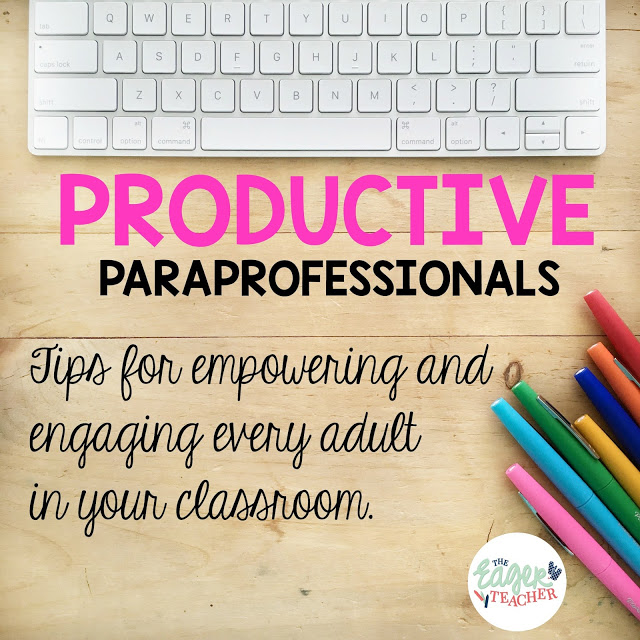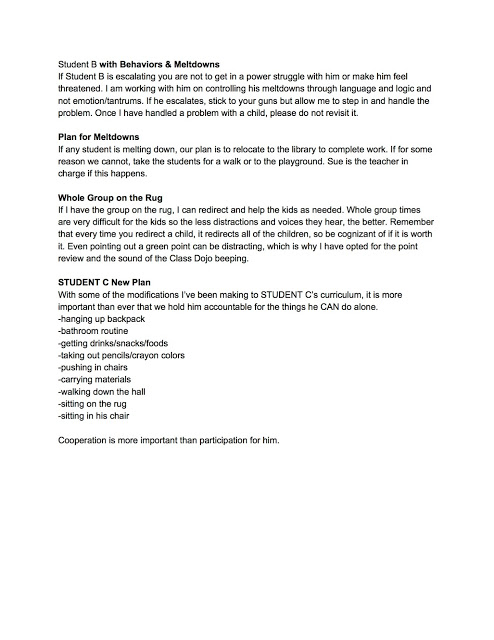In my region of the country we call our paraprofessionals teacher aides, but I am aware that through most of the country these God sent people are referred to as paras. Whatever you call them, we can all agree that they are instrumental in a special education classroom.
For the purpose of this post, I will be using both terms synonymously.
I wouldn’t survive without my aides, and I am always alarmed when I hear teachers complain about their aides. Don’t get me wrong, it can be very challenging to manage adults when you are managing students with disabilities all day. But I truly believe that paraprofessionals and aides can make or break your classroom. Here are some tips for creating an environment that empowers and engages your aides for the good of the kids.
1. Decide what you want from them and set expectations right away. I often hear teachers say that their paras do not do their job or interfere with the students instead of support them. One thing to remember is that in most schools, paras are assigned on an annual basis, often moving through different grade levels and different programs from year to year. An inclusion aide has a much different job description than a functional self-contained aide. Set expectations and share that
with your aide at the beginning of the year. Type up a list of their daily responsibilities and expectations. They don’t know what they don’t know.
3. Be a team. Include your aide in decisions that you feel they can be included in, like where to hang things or how to organize something. Ask for their input or advice about a child if you feel they have insight from specials, bus duty, etc.. They will feel like a valued part of the team and will be more willing to be reflective if they feel that their input matters to you.
4. Give them space. Even if you don’t have room for your paras to have their own desk or closet, make sure they at least have a drawer or a space in the room for their belongings. Nobody wants to go through a school year storing their purse and lunch on a heater. Saying things like “our classroom” and “our students” can go a long way!
6. Be respectful. Never, ever, ever correct or reprimand a para in front of your students. You are shooting yourself in the foot! If YOU don’t have respect for your paras, do you think your students will? Always correct them or discuss matters in private, with no students or other aides present.
7. Require Confidentiality. Many aides may live in the community or even have children at your school. It is pertinent that you explain to them how important confidentiality is. The last thing you want is for your aide to get cornered by a parent at the grocery store looking for information. Give them an out and tell them to defer all parent questions and concerns to you. If you make it a classroom policy, it will eliminate any blurred lines. I also address this with parents at Open House/Meet the Teacher Night.
8. Be honest. If you feel that an aide has room for improvement, tell them. This is something I have struggled with as a young teacher, because most of the paras I work with are much older than me. It is uncomfortable to tell them that they need to improve on something, but it is also my job. It is a disservice to your students if you do not have high expectations for all of the adults in your room. When it comes time for evaluations, be honest and straightforward.
9. Have a regular meeting. My key to success with paras is having a weekly, monthly or quarterly meeting. Each year your paras will have a different chemistry with the kids and the other paras/adults in your room. Some years you might find it necessary to only have a quarterly meeting and other years it might be necessary to have a weekly meeting. It all depends on the kiddos in your room and the paras that are assigned to you.
10. Praise them. I know, this seems so simple but it doesn’t happen as often as it should. Find reasons to praise them and let them know you appreciate them. Surprise them with a coffee or send a nice text saying that they are making a difference in the lives of your students. You know how good that feels as the teacher, the same goes for paras!






